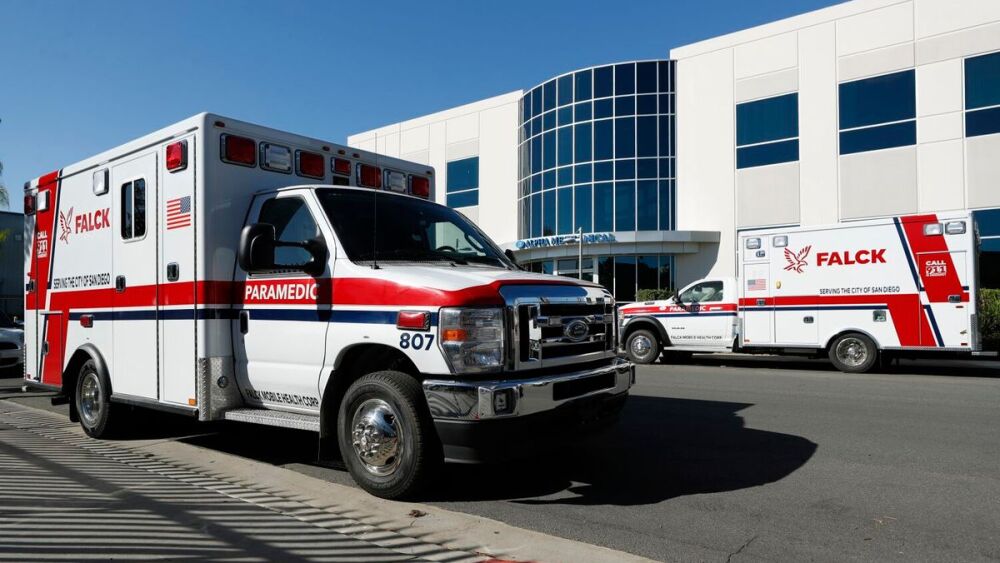By David Garrick
The San Diego Union-Tribune
SAN DIEGO — Major changes San Diego is making to city ambulance service began paying off last month, when significantly more ambulances were on the road for more hours — exceeding a city goal that had never before been met.
The surge is partly the result of San Diego’s recent move to require ambulance provider Falck USA to contract with a second provider, American Medical Response, for 48 more ambulance hours per day.
But Falck has also sharply increased the number of ambulance hours it can provide by expanding its workforce. Company officials credit that expansion to higher pay, $50,000 signing bonuses and accelerated training for new hires.
Falck averaged 879 ambulance hours per day in June — much closer to a city goal of 900 hours per day than Falck has ever come since taking over San Diego’s ambulance service in November 2021.
Combined with the 48 hours per day provided by AMR, which began working as Falck’s subcontractor May 29, total ambulance hours per day in San Diego averaged 927 in June.
That’s up from previous months. Average daily hours were 795 in January, 786 in February, 788 in March, 795 in April and 845 in May.
The surge comes just as city officials are scheduled to consider July 19 a fundamental shift in ambulance service toward a new system known as the alliance model.
Under the existing model for ambulance service, Falck pays San Diego $9 million a year for the right to charge patients for the roughly 300 ambulance transports per day in the city.
Under the new model, the city will pay Falck, AMR and any other providers fees to operate ambulances and will have the right to charge patients itself.
While the model shifts financial risk from Falck to the city, supporters say the change makes financial sense.
That’s because a new state law that took effect in January makes the reimbursement rates public agencies get from Medicare and Medi-Cal patients nearly triple the rates private ambulance providers get.
Falck’s recent success at boosting ambulance hours may help lock the company in as the city’s primary provider under the new model. Falck’s previous struggles had prompted city officials to consider bringing ambulance service in-house.
The labor union representing Falck’s paramedics and emergency medical technicians — the San Diego Association of Prehospital Professionals — said Thursday that the recent surge shows Falck has a sustainable plan for San Diego.
“They’re in it for the long haul,” said union president Tony Sorci. “Having 900 hours per day or better is the magic sauce.”
That number of ambulance hours allows the city’s deployment model to work effectively, eliminating the need for ambulances from Rancho Bernardo to handle emergencies in Ocean Beach or for ambulances in Tierrasanta to handle San Ysidro.
Not being overworked boosts employee morale and allows Falck to spread emergency calls more equitably over its ambulance units, Sorci said.
Sorci credited $50,000 signing bonuses established last winter for part of the staffing increase. He noted that paramedics hired before the new bonuses had gotten only $12,000 when hired, so Falck decided to give them all $38,000 more retroactively.
Another factor in the staffing surge has been 17 percent pay raises over three years that Falck paramedics got in a new labor deal finalized this spring.
Before the new deal, the starting annual salary for Falck paramedics in San Diego was $57,206.
Falck officials said Thursday that the company has always been committed to San Diego and that its efforts to overcome a nationwide shortage of paramedics are finally succeeding.
“What we’re seeing now is the payoff for a lot of the long-term investments we’ve made in the system,” said Falck spokesperson Jeff Lucia.
Falck’s managing director for San Diego, John Goward, said San Diego is a remarkable success story, considering paramedic shortages elsewhere in the nation.
“Our intensive efforts to recruit, train and retain paramedics, along with the City Council’s decision to approve subcontracting, made the difference in June, and we are confident that we are in a strong position moving forward,” Goward said.
The alliance model is scheduled for debate by the council’s Public Safety Committee July 19. The model could be approved by the full council before its summer legislative recess, which will run from Aug. 2 through Sept. 5.
This story originally appeared in San Diego Union-Tribune.
©2023 The San Diego Union-Tribune.
Visit sandiegouniontribune.com.
Distributed by Tribune Content Agency, LLC.


